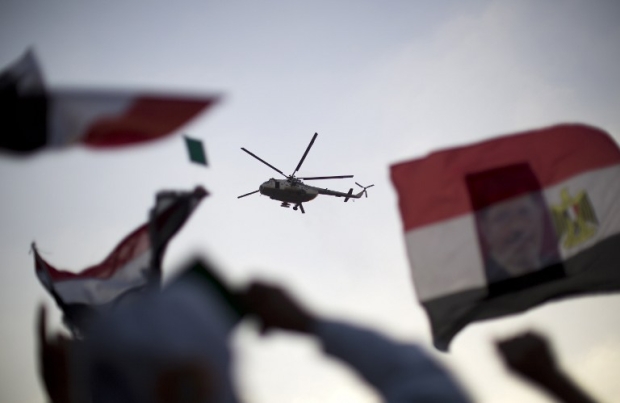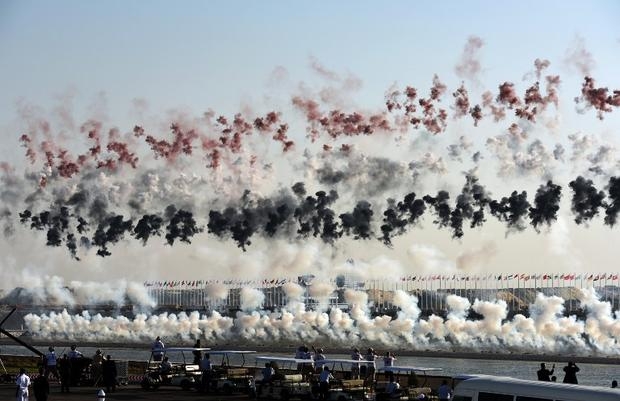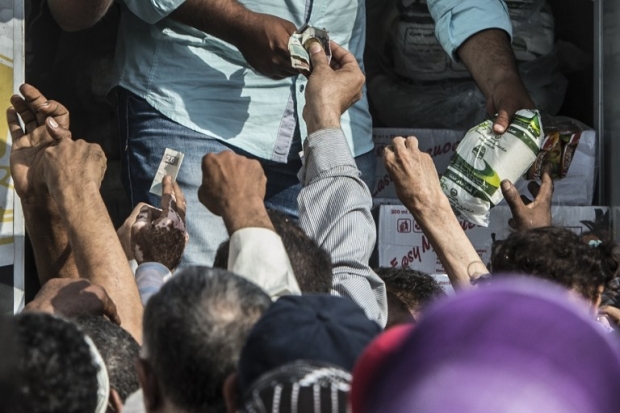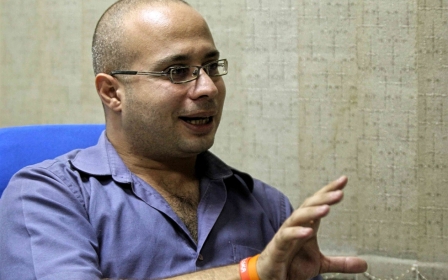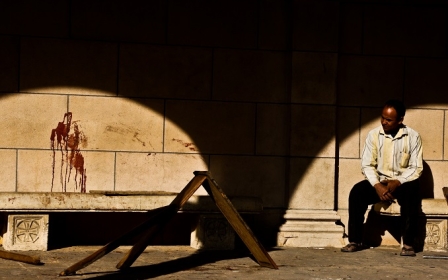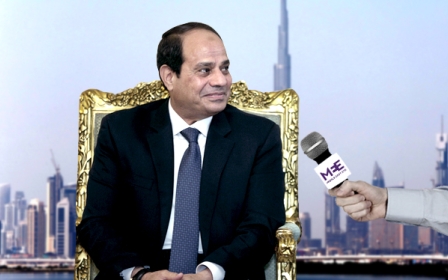Why 2017 is the year Sisi will sink
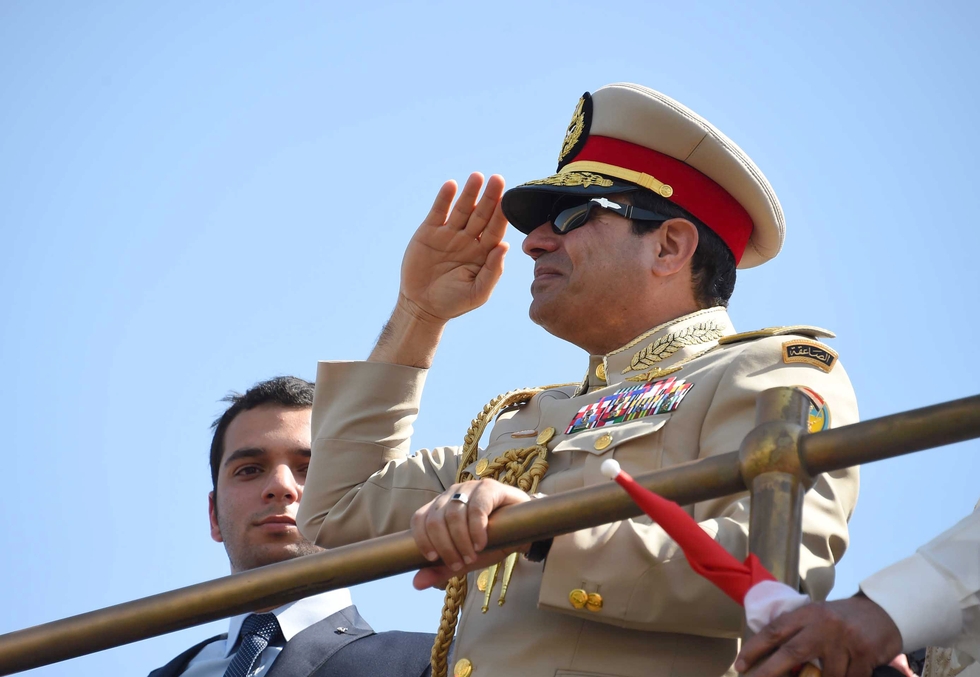
Traditionally, a new year begins with hope. But since Abdel Fattah al-Sisi has taken hold of power in Egypt, hope has been hard to come by.
A couple of days ago, I was talking with an acquaintance of mine in New York who has recently arrived from Egypt and it quickly became clear that this lack of hope – and increasing anger – is our new norm.
For many, it is no longer a question of if Sisi must go - it is a question of when, and how and who will replace him
His salary in New York can't even keep up with the hyper inflation back home. “We bought a washing machine for 3500 Egyptian pounds ($195) three years ago. That same washing machine was 17,000 EGP ($945) yesterday,” he told me.
Even so, my friend is far better off than many middle class and lower middle-class Egyptians. Unless you are drowning, as they are, you will be hard pressed to understand the dire forecast: without significant and near immediate political and economic changes, Sisi is unlikely to complete the year in office.
READ: It's 2018: Live from exile in Dubai, it's Sisi on Sisi
This week, at the same cafe in New York whose patrons were 99 percent pro-Sisi and used physical force against anti-Sisi voices in the past, a stunning conversation took place: who can replace Sisi?
For many, it is no longer a question of if Sisi must go - it is a question of when, and how and who is there to replace him. The central question then becomes: are similar conversations taking place within circles of power?
A hammer looking for nails
If we are to divide the Sisi era into two halves, we can safely say the initial failures were borne of a military mentality that functions as a hammer with everything in its way a nail to be driven into the ground.
Whether those "nails" were peaceful Egyptian citizens of an Islamist persuasion, or activists with a revolutionary leaning, intellectuals, journalists or otherwise, Sisi came into office, apparently, having decided that his voice must be the only voice heard by Egyptians.
Though it is well-established that Sisi was one a handful of officials who pushed the button for the Rabaa massacre, that killed upwards of 1000 Egyptians, he still had no problem becoming president because the general perception was that he would rid Egypt of the Muslim Brotherhood and that would be sufficient to guarantee his presidential bid.
But applying the iron fist to a group committing the cardinal sin of delivering political solutions through a religious intravenous tube is one thing. Solving the puzzle of a nation imploding is another altogether.
Silencing critics
Not long after the systematic jailing of more than 60,000 Egyptians for political viewpoints that the regime deems troublesome, it became apparent that the shutting of Egyptian mouths would extend further into an attack on NGOs and on the media at large.
Had journalists had the freedom to report to readers about the Suez project before it happened, would we now have an extremely handy extra stash of $8.5bn in foreign currency?
Some Sisifites have attempted to suggest that it is a corrupt minority within the upper ranks of the Sisi universe that are using these strong-arm tactics. Sisi himself continues to insist that Egyptian journalists enjoy unparalleled freedoms.
"I do not want to exaggerate,” remarked Sisi in September 2015 while doing exactly that. “But we have unprecedented freedom of expression in Egypt.”
But the facts on the ground belie Sisi’s claims, with Reporters Without Borders (RSF) calling him a “predator of press freedom” just months ago.
The horrific Suez Canal investment is a perfect example. The project cost $8.5bn, yet only 0.0033 percent more tariff-paying ships actually passed through the waterway after it was complete.
Had Egyptian journalists had the freedom to investigate and report to readers about the project before it happened, would we now, at a time of unmatched economic crisis, have an extremely handy extra stash of $8.5bn in foreign currency?
Freezing himself out
The second half of the Sisi era was his utter failure with the economy, made all the worse by his mismanagement of multiple foreign relations, particularly in the all-important Gulf which has progressively lost faith in his obviously overmatched leadership.
If things are so unstable politically and economically for an Egyptian who defines the very term "upper echelon", how do you think the vast majority of Egyptians perceived the past year under Sisi?
In losing political muscle and former supporters in those two crucial camps, Sisi has only upped the heat on himself. Many of those who once supported him in the United Arab Emirates and Saudi Arabia, and within Egypt’s business elite and its upper middle classes - not to gloss over the 27 million impoverished Egyptians, including many in the Christian community - feel Sisi hasn’t stood by them, and they are quickly jumping ship.
“I don’t know how 2016 was for you but for me it was atrocious,” the Egyptian multi-billionaire Nabil Sawiris tweeted late last month.
If things are so unstable politically and economically that a man who defines the very term "upper echelon" is complaining, how do you think the vast majority of 90 million Egyptians perceived the past year under Sisi leadership?
If Sisi is to spend 2018 as a citizen, or to meet a fate similar to his predecessors, it will be the economy that serves as his noose. Since the long-discussed devaluation of the pound, which the IMF insisted upon as a prerequisite for the $12bn, loan prices have skyrocketed.
READ: Egypt's economic crisis - Four ways the currency flotation causes more problems than if solves
When I spoke with several analysts in November, there were two predictions generally agreed upon across the board: inflation in Egypt - along with prices - would skyrocket and, consequently, social safety nets would become of paramount importance.
Sadly, for the nation and likely painfully for Sisi, the first event has occurred. Inflation has romped its way to 20 percent and beyond but no social safety nets to speak of have been put in place.
Things have quickly regressed to the point where in a recent conversation over Skype video, I noticed that the person on the other end was in both a sweater and under a blanket. I knew it was cold in Cairo, so I asked the person I was talking to why she wasn’t using her heater.
Her answer was telling: do you know how much electricity costs have risen and how much it would cost me to use that heater?
Egyptians are having to make choices under Sisi that no human being should have to make. When enough Egyptians are cold, hungry and angry, no political or security calculation will be able to impede the inevitable flood.
Arms bonanza while people go hungry
Further expediting his political end is an inability to lead the nation as anything but a military man. Sisi, knowing fully well that his nation was quickly sinking to unseen economic lows, still managed to become the second largest international buyer of weapons, after Qatar, in 2015, spending nearly $12bn.
When Egyptians of all classes at this point are having difficulty buying rice, sugar, tea and cooking oil because of exploding prices and a dearth of available supplies, how can one expect anger not to boil over when they know billions are being spent on arms much more likely to be used for repression than in warfare?
It is not a dynamic unfamiliar to dictators of the world but it is also one that, more often than not, leads to an all too familiar ending to the story.
Sisi forgets this. The year ahead shall remind him. The moment the wrong people in the police or the army hierarchy begin to understand that his presidency runs contrary to their interests, he will become a historical footnote.
No one in their right mind can say what day Sisi will be removed from power. The timing, the manner and by whom are, most assuredly, deeply embedded within the realm of the unknown.
But this much is certain: rather than attempt to correct a myriad of governance errors, Sisi continues to march towards the precipice with his own tragicomic flair.
If he keeps it up, this new year prediction will be a reality before the year is out.
- Amr Khalifa is a freelance journalist and analyst recently published in Ahram Online, Mada Masr, The New Arab, Muftah and Daily News Egypt. You can follow him on Twitter@cairo67unedited.
The views expressed in this article belong to the author and do not necessarily reflect the editorial policy of Middle East Eye.
Photo: Egyptian President Abdel Fattah al-Sisi waves as he stands on an historic yacht leading a naval flotilla during a ceremony on 6 August 2015 to unveil a new waterway at the Suez Canal, in the port city of Ismailiya (AFP)
This article is available in French on Middle East Eye French edition.
New MEE newsletter: Jerusalem Dispatch
Sign up to get the latest insights and analysis on Israel-Palestine, alongside Turkey Unpacked and other MEE newsletters
Middle East Eye delivers independent and unrivalled coverage and analysis of the Middle East, North Africa and beyond. To learn more about republishing this content and the associated fees, please fill out this form. More about MEE can be found here.



